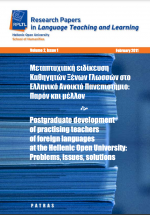Abstract:
Launching the distance-learning student-tutor interaction process, tutors of the first module of the M.Ed in English course at the HOU lay the foundations of academic student autonomy by means of providing – inter alia -- the appropriate written feedback on written assignments. In doing so, they need to gauge the content and form of their written comments systematically with regard to both output- and student-, that is human factor-related issues (cf. Goldstein, 2004), the latter being particularly relevant to the distance-learning context. In this article we discuss tutor policy as well as tutor perceptions (cf. Lee, 2004, 2009 among others) regarding written feedback on students’ academic assignments in terms of aspects of deviance treated and the relative gravity of ‘global’ and ‘local’ errors (e.g. Ferris, 2002), the directness of the correction, the punitive or facilitative nature of the comments provided as well as the relative balance of student strengths and weaknesses on the tutor’s comment agenda (cf. Hyland & Hyland, 2006). The role of the tutor as an assessor and/or counsellor is explored and the importance of striking a delicate balance between the two, especially in a context where face-to-face feedback opportunities are severely restricted, is underscored. We suggest that distance-learning feedback practices may need to be at least partially individualized to maximize student response and meet the goal of ‘informed autonomy’.
Publisher's Version


